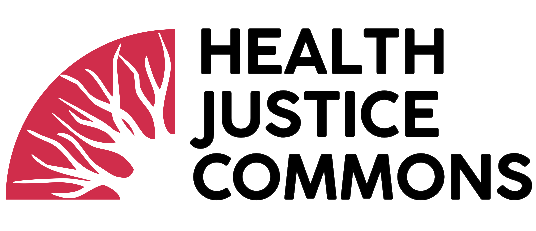5 Health Justice Commons Principles:
#1 - Justice is the best medicine
#2 - Health is the greatest wealth
#3 - No one is disposable
#3 - No one is disposable
Every living being, human or non-human is invaluable. In a world reliant on interconnection for our collective survival, there is no ‘away’.
Interpersonal social stigma coupled with institutional discrimination work together in 21st century societies to justify and enact the systematic mistreatment, marginalization, neglect and abuse which gives rise to disposability. When someone is treated as disposable their rights and dignity are violated with impunity, and their extreme mistreatment and marginalization from society is justified in ways which often endangers their lives.
In the US, 2.3 million people are currently incarcerated, in many states, even once serving their sentence, people permanently lose their right to vote and serve on juries. They face barriers to housing and employment. Desmond Meade, the President of the Florida Rights Restoration Coalition, which led a successful campaign in the state of Florida to restore peoples’ right to vote is an attorney, yet due to state laws he will never be able to formally practice.
In the US today, we collectively believe that if someone breaks the law, they should be ‘put away, and that this somehow truly serves our society or lessens the suffering of the aggrieved in cases of violent crime or theft. In reality, the Prison Industrial Complex (PIC) disproportionately targets People of Color (POC), transgender women, people with disabilities and LBG/ gender non-conforming people. The PIC generates over $74 billion, but $39 billion of that is underwritten by taxpayer’s money, much of which goes into the coffers of private prisons while creating broken families, communities, and immeasurable human misery. Michelle Alexander, an expert on the PIC, calls the system the New Jim Crow.
The practices of the PIC, jails and prisons themselves, the criminal justice system, and its laws, illustrate how US society normalizes and legitimizes rendering people disposable – systematically silencing their voices and making their lives nearly unlivable.
We may think that these extremes of exclusion and violence are confined to the PIC. Unfortunately, the Medical Industrial Complex (MIC) is profoundly complicit in rendering people disposable as well. Medical technologies and techniques are systematically used to humiliate, control peoples’ behavior, and punish them, often with life-threatening consequences.
For example, many states, including Kentucky, have ‘informed consent’ laws on abortion. In cases in which a pregnancy is further along than 9 weeks, these laws require that any person seeking an abortion must submit to a transvaginal ultrasound exam. This procedure uses an internal probe, is highly invasive and uncomfortable, and medically unnecessary. The laws further dictate that during this procedure medical providers must describe the fetus in detail, point out its organs, and play the sound of the heartbeat. Patients can only shield themselves from this by covering their ears and making noise to drown it out.
In January of 2019, 9 ICE detainees on hunger were forced-fed, a practice Human Rights Watch has called “inherently cruel, inhuman and degrading” and decried even by the relatively conservative International Red Cross. Here is one hunger striker’s account of force-feeding: “They tie us on the force-feeding bed, and then they put a lot of liquid into the tubes, and the pressure is immense so we end up vomiting it out,” the detainee, identified only by his surname, Singh, told the AP. “We can’t talk properly, and we can’t breathe properly. The pipe is not an easy process, but they try to push it down our noses and throats.” This practice was used in Guantanamo Bay as well.
Practices of disposability which employ medical technologies are also in widespread use for the implementation of unjust immigration policies. Since June 2018, there has been mounting public outcry over the forced use of anti-psychotic medications on children in US custody. The children were told the medications were vitamins and that they would not be able to see their families or be released if they didn’t take them. When children refused, they were routinely kicked, punched or held down. A class action lawsuit on behalf of the children is still pending.
Disposability often encompasses withholding of care. A tragic example of this is the death of 7 year old Jakeline Caal while in Customs and Border Control detainment. At least 6 other children have died in border control custody since Jakeline’s passing in early December 2018. As of February 2019, 11,500 children remain in US custody, many in for-profit detention centers. According to the Southern Poverty Law Center (SPLC), this is an 80% increase from last year. The SPLC asserts that many children have family members to whom they can be released.
The logic of disposability is also reinforced by our economy. Forced obsolescence, the practice of making products from cars to computers that become quickly outdated or hard to maintain because parts or software are unavailable, trains us through control of our consumer choices to adopt the belief that discarding the old in favor of the new is not only simple, it’s sensible and desirable.
Rather than recognizing that excessive waste is a planetary threat, big industries such as fossil fuels use waste as a motor for profit by creating enormous industries from it, plastic for example, which is made from petroleum waste products. Plastic pollution dramatically exposes that our planet is a closed, deeply interconnected system in which there is no true ‘away’. Everything goes somewhere, as is painfully evidenced by the 50 pounds of plastic recently recovered from the stomach of a pregnant whale who was found on a beach in Sardinia, Italy in April 2019.
For global health to thrive, justification for and practices of disposability of people, the planet and life itself must be disrupted and transformed.
